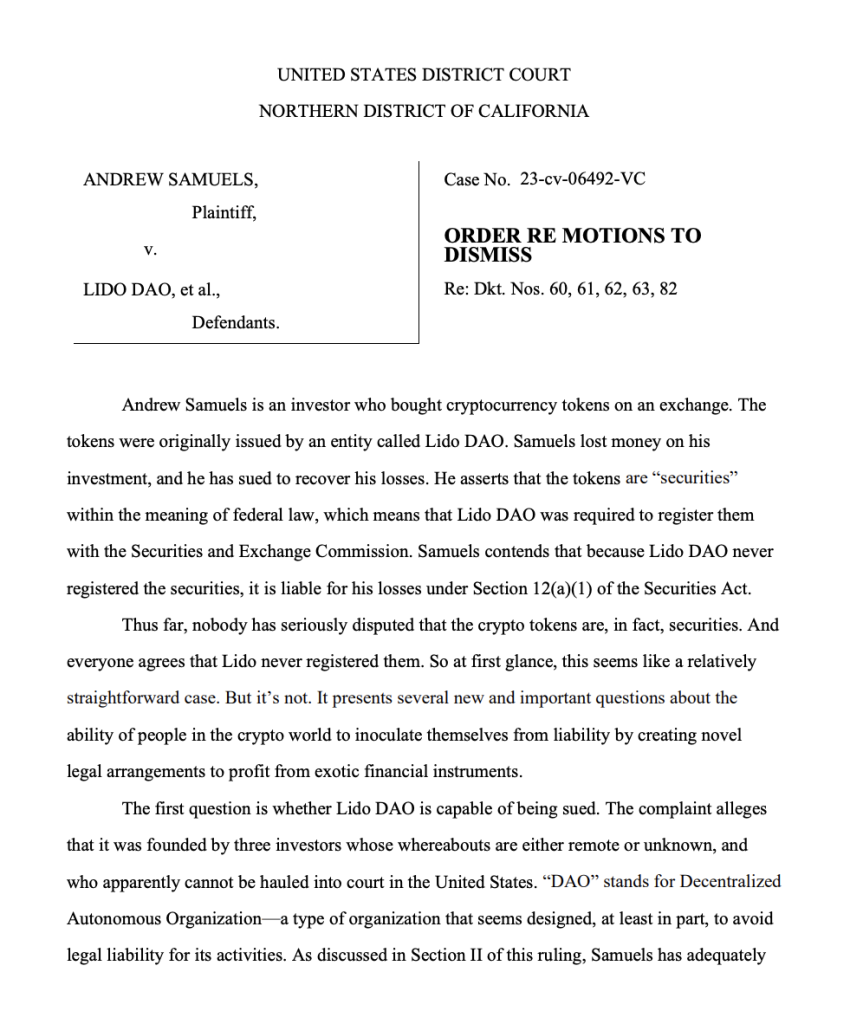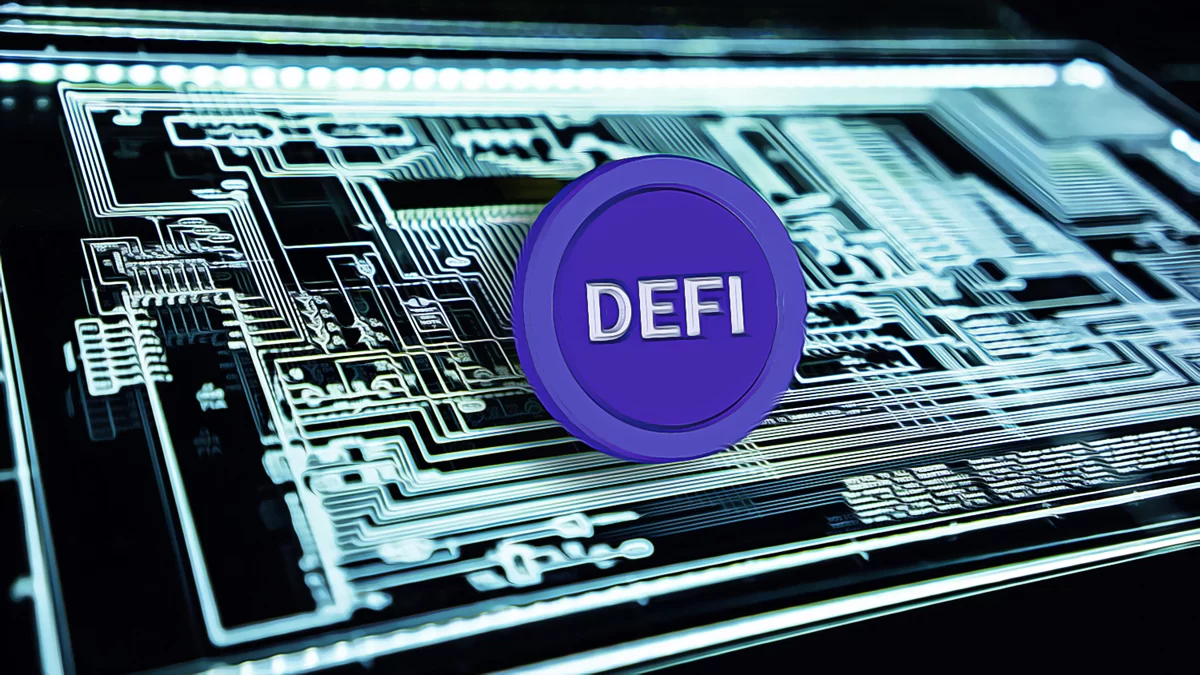DAO Members Liable Under Partnership Law: California Ruling

Share:
In a groundbreaking decision, a California court has ruled that decentralized autonomous organizations (DAOs) can be treated as general partnership under state law, exposing their members to potential liability for the actions of other participants.
The ruling, issued by U.S. District Judge Vince Chhabria on November 18, focuses on Lido DAO, the governing body behind the liquid staking protocol, and its members.
This decision represents a significant precedent in regulating DAOs, bringing a bigger risk to decentralized governance structures.
DAO Governance Restructuring: Are Members Now Liable Under Partnership Law?
The case arose when Andrew Samuels, an investor in Lido DAO’s native tokens (LDO), filed a lawsuit alleging that the tokens were unregistered securities.

Samuels claimed that Lido DAO should have registered the tokens with the U.S. Securities and Exchange Commission (SEC) and held the DAO liable for his losses.
Judge Chhabria’s ruling confirmed that Lido DAO qualifies as a general partnership under California law, meaning its members could be held responsible for the organization’s actions.
The court identified several large institutional participants, including Paradigm Operations, Andreessen Horowitz, and Dragonfly Digital Management, as general partners due to their alleged involvement in Lido DAO’s governance and operations.
While these entities face potential liability, Robot Ventures, another alleged partner, was dismissed from the case due to insufficient evidence of its participation in DAO activities.
The court emphasized that Lido DAO’s decentralized structure does not exempt it from legal responsibility.
Judge Chhabria noted that individuals or entities engaging in governance or operational activities within a DAO could be considered partners under state laws, regardless of the DAO’s self-proclaimed decentralized nature.
Implications for Decentralized Governance
The ruling has far-reaching implications for DAOs, many of which rely on token-based governance systems.
Miles Jennings, the General Counsel at Andreessen Horowitz’s crypto division, described the decision as a “huge blow to decentralized governance.”
Jennings warned that even minimal involvement in a DAO, such as posting in a governance forum, could be interpreted as evidence of partnership and lead to liability.
The decision is part of the growing scrutiny DAOs face as they expand into financial markets.
With this new rule, treating DAOs as general partnerships, courts may hold members accountable for organizational actions, challenging the notion that decentralization inherently limits liability.
The court’s interpretation extends liability to governance structures where token holders make decisions and share profits, a common model among DAOs.
It also dismisses arguments that the lack of direct token sales shields DAOs from securities laws, broadening the definition of “offer or sale” to include solicitation through exchanges.
As many argued under Jennings’ post, this ruling could signal a shift in how DAOs operate, encouraging participants to adopt formal legal structures to mitigate liability.
Similarly, the SEC recently filed charges against Mango DAO and Blockworks Foundation for the unregistered sale of $70 million of MNGO tokens, labeling them as crypto asset securities.
Mango DAO agreed to a $700,000 penalty, destroyed its MNGO tokens, and requested that exchanges halt MNGO trading.
The SEC also charged Mango Labs LLC, a developer for Mango DAO, for unregistered broker activity.
The SEC emphasized in the report that DAO status does not exempt entities from securities registration requirements.
With Mango DAO already facing a penalty for a similar lawsuit, the likelihood of Lido DAO not winning the current standing lawsuit against them is high.
The post DAO Members Liable Under Partnership Law: California Ruling appeared first on Cryptonews.
Read More
DAO Members Liable Under Partnership Law: California Ruling

Share:
In a groundbreaking decision, a California court has ruled that decentralized autonomous organizations (DAOs) can be treated as general partnership under state law, exposing their members to potential liability for the actions of other participants.
The ruling, issued by U.S. District Judge Vince Chhabria on November 18, focuses on Lido DAO, the governing body behind the liquid staking protocol, and its members.
This decision represents a significant precedent in regulating DAOs, bringing a bigger risk to decentralized governance structures.
DAO Governance Restructuring: Are Members Now Liable Under Partnership Law?
The case arose when Andrew Samuels, an investor in Lido DAO’s native tokens (LDO), filed a lawsuit alleging that the tokens were unregistered securities.

Samuels claimed that Lido DAO should have registered the tokens with the U.S. Securities and Exchange Commission (SEC) and held the DAO liable for his losses.
Judge Chhabria’s ruling confirmed that Lido DAO qualifies as a general partnership under California law, meaning its members could be held responsible for the organization’s actions.
The court identified several large institutional participants, including Paradigm Operations, Andreessen Horowitz, and Dragonfly Digital Management, as general partners due to their alleged involvement in Lido DAO’s governance and operations.
While these entities face potential liability, Robot Ventures, another alleged partner, was dismissed from the case due to insufficient evidence of its participation in DAO activities.
The court emphasized that Lido DAO’s decentralized structure does not exempt it from legal responsibility.
Judge Chhabria noted that individuals or entities engaging in governance or operational activities within a DAO could be considered partners under state laws, regardless of the DAO’s self-proclaimed decentralized nature.
Implications for Decentralized Governance
The ruling has far-reaching implications for DAOs, many of which rely on token-based governance systems.
Miles Jennings, the General Counsel at Andreessen Horowitz’s crypto division, described the decision as a “huge blow to decentralized governance.”
Jennings warned that even minimal involvement in a DAO, such as posting in a governance forum, could be interpreted as evidence of partnership and lead to liability.
The decision is part of the growing scrutiny DAOs face as they expand into financial markets.
With this new rule, treating DAOs as general partnerships, courts may hold members accountable for organizational actions, challenging the notion that decentralization inherently limits liability.
The court’s interpretation extends liability to governance structures where token holders make decisions and share profits, a common model among DAOs.
It also dismisses arguments that the lack of direct token sales shields DAOs from securities laws, broadening the definition of “offer or sale” to include solicitation through exchanges.
As many argued under Jennings’ post, this ruling could signal a shift in how DAOs operate, encouraging participants to adopt formal legal structures to mitigate liability.
Similarly, the SEC recently filed charges against Mango DAO and Blockworks Foundation for the unregistered sale of $70 million of MNGO tokens, labeling them as crypto asset securities.
Mango DAO agreed to a $700,000 penalty, destroyed its MNGO tokens, and requested that exchanges halt MNGO trading.
The SEC also charged Mango Labs LLC, a developer for Mango DAO, for unregistered broker activity.
The SEC emphasized in the report that DAO status does not exempt entities from securities registration requirements.
With Mango DAO already facing a penalty for a similar lawsuit, the likelihood of Lido DAO not winning the current standing lawsuit against them is high.
The post DAO Members Liable Under Partnership Law: California Ruling appeared first on Cryptonews.
Read More











